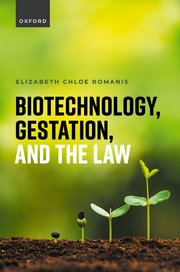Former Petrie-Flom Fellow-in-Residence Elizabeth Chloe Romanis not too long ago revealed her newest ebook, Biotechnology, Gestation, and the Regulation, with Oxford College Press. She wrote a lot of this monograph throughout her time on the Petrie-Flom Heart and the Edmond and Lily Safra Heart for Ethics in 2022-2023. Right here, we meet up with Chloe to ask her concerning the ebook and its key themes.
Petrie-Flom Heart: What’s Biotechnology, Gestation, and the Regulation about?
Chloe: The place folks expertise involuntary childlessness as a result of they can not, for organic, social, or psychosocial causes, maintain a being pregnant, they will pursue parenthood via routes that imply different folks have undertaken the gestational work, e.g. surrogacy or adoption.
Nonetheless, these routes don’t at all times meet the procreative wants of people as a result of they wish to gestate themselves, or as a result of they worth genetic relatedness.
Applied sciences on the horizon — which I name applied sciences enabling gestation — are thrilling as a result of they’ve the potential to allow new modalities of gestation that higher meet the procreative wants of people who can not maintain a being pregnant. Nonetheless, these applied sciences additionally increase large questions, in a metaphysical and ethical sense, about how we procreate, and the way we relate to procreation. I handle a few of these questions and use the insights to interrogate associated ethico-legal challenges together with who can entry applied sciences enabling gestation, how we determine and classify mother and father, and the implications for gender equality and for abortion entry.
Are you able to clarify this idea of “unsexing being pregnant”? The place is the know-how at at present?
The thought for the idea of ‘unsexing being pregnant’ got here from occupied with uterus transplantation. Uterus transplants (UTx) are within the technique of transitioning from an experimental surgical process to being regarded as a therapy for absolute uterine issue infertility. The process has, up to now, solely been carried out on cis girls. Nonetheless, surgeons and bioethicists alike have begun to replicate on the concept of uterus transplant for trans girls and cis males. Whereas it might be a while earlier than UTx is offered on this means, it provides the chance for occupied with pregnancies past the shackles of how we take into consideration sexed roles in procreation — what some our bodies simply can or can not do.
Many males and nonbinary folks, after all, grow to be pregnant and maintain pregnancies. They’re, nonetheless, topic to appreciable transphobia and structural violence. A lot of it’s because those that subscribe to a organic essentialist account of ‘intercourse’ usually problematically fall again on the capability to maintain a being pregnant as a approach to differentiate between ‘male’ and ‘feminine’ our bodies. Applied sciences that additional illustrate the tenuous nature of a binary strategy to sexing our bodies based mostly on their capability (or not) to maintain a being pregnant needs to be welcomed. There are additionally the extra advantages from the chances of ‘unsexing’ that needs to be taken severely as provocations: What would the world seem like if cis males may, and did, undertake being pregnant?
You confer with “gestation past the physique.” How may that change reproductive science?
Gestation past our bodies, or ‘ectogestation’ (gestation facilitated by machine), is an entirely speculative thought within the present state of play. Groups of fetal scientists and surgeons engaged on constructing a synthetic placenta are centered on revolutionising neonatal intensive care, making a machine that may assist entities with fetal physiology to develop and mature such that they’re extra prone to survive with out long-term well being points. So, these units usually are not designed for, and never able to, rising infants from scratch to start. That might be a unique system, and there are many authorized and regulatory hurdles that stand in the best way (e.g. limitations on embryo analysis), and there may be a lot we simply have no idea about gestation and, subsequently, how you can emulate it.
I believe it’s necessary to be clear about what know-how can not do and the hurdles in the best way of creating full ectogestation. However speculating concerning the chance, its moral, social, and authorized challenges is nonetheless an necessary train. Imagining full ectogestation and what it may imply and its potential implications can nonetheless educate us a lot concerning the nature of gestation, how we deal with pregnant folks, and up to date procreative injustices.

Romanis’ ebook, Biotechnology, Gestation, and the Regulation, is offered right here.
You write that being pregnant itself hasn’t been studied a lot from a authorized/moral/educational perspective. Whereas, clearly the fetus has been an enormous focus. Why do you assume that’s?
Suki Finn remarks that being pregnant itself, as a state of being, isn’t seen as one thing worthy of philosophical interrogation. There’s a lot literature about points that come up inside a being pregnant (principally abortion), however that is hardly ever consideration of the state of being itself and sometimes as an alternative is not directly really concerning the fetus. Historically each educational regulation and philosophy have been fields dominated by individuals who haven’t skilled (and can’t expertise) being pregnant, influencing determinations about what was necessary to consider. Additionally, the development of the fetus as separate from the pregnant individual and in want of safety is a social and cultural script that has dominated considering.
In philosophy, there are rising our bodies of labor, just like the phenomenology of being pregnant and the metaphysics of being pregnant, that recognise being pregnant as one thing that we are able to and may take into consideration extra. These insights have been under-utilised by authorized students, and there’s a want to consider gestation (distinct from being pregnant) too, so that’s what I sought to do on this ebook!
What would you like readers to remove out of your ebook?
A lot of how we regulate procreation right here in England and Wales is underpinned by organic essentialism that dictates who can entry procreative applied sciences, what the results of utilizing procreative applied sciences are, and when pregnant individuals can terminate their pregnancies. My thought is that in the end applied sciences enabling gestation have some actually thrilling potential, significantly for many who expertise involuntary childlessness associated to an incapacity to gestate, nonetheless, this potential is considerably restricted except there may be important social and authorized reform to handle the organic essentialism on the root of how we take into consideration and regulate procreation.
Concerning the ebook’s writer
Elizabeth Chloe Romanis was a Fellow-in-Residence on the Edmond and Lily Safra Heart for Ethics and the Petrie-Flom Heart for 2022-2023. She is an Affiliate Professor of Biolaw at Durham College, UK. Chloe does analysis in healthcare regulation and bioethics with a selected curiosity in copy and the physique (abortion, gestation, being pregnant, and start).




